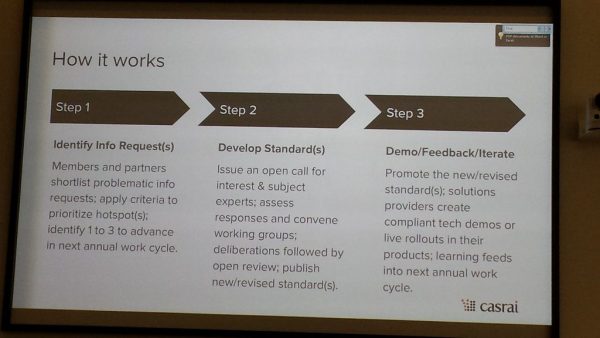Earlier this week, we hosted the UK meeting of CASRAI (Consortia Advancing Standards in Research Administration Information), here at our London headquarters. This was the first meeting of the new UK chapter of CASRAI, bringing together members of the research community from institutions throughout the country.
CASRAI is “an international nonprofit membership initiative led by research institutions and their partners. [Their] mission is to adapt the principles and best practices of open standards and data governance to lead and facilitate key stakeholders in annual deliberations to develop ‘standard information agreements’ that serve as bridges between research information users.”

Valerie McCutcheon, Research Information Manager at the University of Glasgow, chaired the meeting, and began proceedings with an outline of what CASRAI does, including their approach to tackling old problems in new ways. Focussing less on the technical and more on user-to-user activities, covering multiple stakeholders within institutions, we covered the different types of information requests involved in research management processes.
In short, CASRAI helps by:
- convening information users (both suppliers & requesters of it)
- conducting an open peer-reviewed process for developing agreements on the contents of information requests (terms / definitions, report formats, data elements, pick list)
- helping agreements to be expressed in a language users can understand and read
CASRAI standards are informal. They are constructed voluntarily, with no policing, and ideas are developed collaboratively, by identifying high-priority issues, developing standards for them, then collecting feedback.

We had a brainstorming session at the event, in which attendees prioritised issues which CASRAI would be well-suited to address. Ideas were sought that:
- brought the most burden to each researcher / administrator affected
- affected the highest number of researchers / institutions
- were feasible to tackle if key stakeholders were engaged
- could ‘piggyback’ onto a current new UK implementation project
Some of the topics that came up were open access scholarship, institutional affiliation IDs, reporting on research outputs (de-duplication / interoperability), and more. It was great to see the enthusiasm and abundance of ideas brought forth by attendees. Some of the conversations really highlighted the difficulty of talking about these concerns without lapsing into reliance on systems and technology, rather than terminology.
This was the first UK CASRAI chapter meeting, and we’re interested in seeing what the future holds, as the group grows and its ideas permeate. Thanks to all who attended – if you’d like more information, have a look at the CASRAI website, where you can join and participate in the community’s discussion. Read on for a compilation of all the #CASRAIUK tweets, with some presentation slides included.